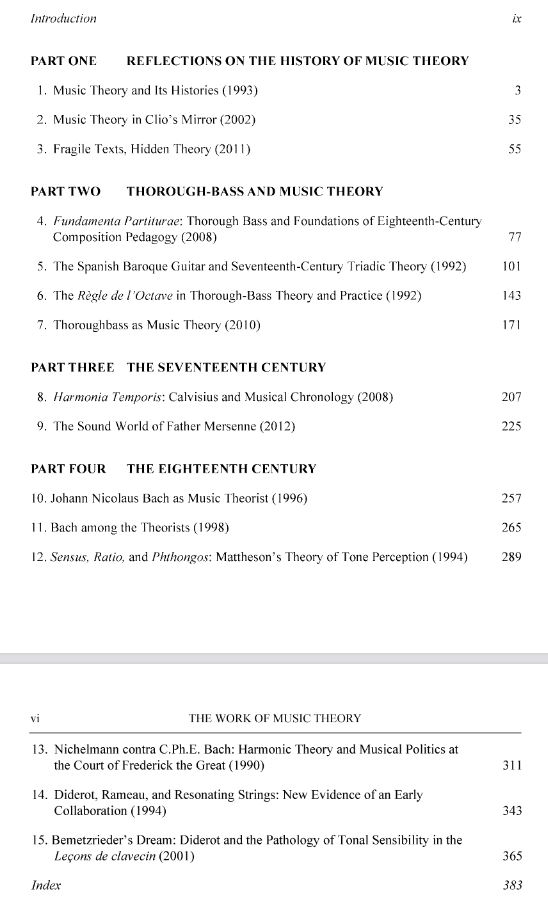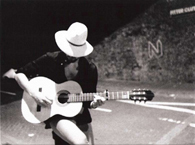Welcome to one of the most active flamenco sites on the Internet. Guests can read most posts but if you want to participate click here to register.
This site is dedicated to the memory of Paco de Lucía, Ron Mitchell, Guy Williams, Linda Elvira, Philip John Lee, Craig Eros, Ben Woods, David Serva and Tom Blackshear who went ahead of us.
We receive 12,200 visitors a month from 200 countries and 1.7 million page impressions a year. To advertise on this site please contact us.
|

|
|
RE: RIP Brook Zern 1941-2019
|
You are logged in as Guest
|
|
Users viewing this topic: none
|
|
Login  | |
|

   
Ricardo
Posts: 14801
Joined: Dec. 14 2004
From: Washington DC

|
 RE: RIP Brook Zern 1941-2019 (in reply to Beni2) RE: RIP Brook Zern 1941-2019 (in reply to Beni2)
|
|
|
quote:
I don't know who "they" are.
Aside from that, there is no single phrygian cadence. iv6-V is one phrygian cadence, the prototype. But phrygian cadences come in many guises. bII-i is found in Bizet and Beethoven and Paco Solea (where paco uses it to tonicize iv). II-i is found in Riqueni and Amigo Solea. And although Montoya and Ricardo use aug6th chords on 2, they are almost always treated as chords. It is not until Sabicas that you see individual lines where someone is actually thinking of how distinc voices might connect (not just intuitive chord to chord). As for leading tone, I am not sure why you are emphasizing that. The whole point of the phrygian cadence is that it is the only one that descends by half-step rather than emphasizing the leading tone. And it is found in the descending tetrachord going back to Foscarini. It might go back even further.
A very important point is that "cadence" only covers a fraction of what we are talking about. The DT a-g-f-e is found in fandangos, jacaras, passacalles in the Baroque guitarists material and there it sometimes is juxtaposed with a plagal i-V progression that can at times seem like a plagal cadence from i-V and at other times a full cadence from V-i. Cadences do not gie the full picture. At any rate, a II-I cadence goes back to a very distant Spanish Baroque past as part of the Andalusian cadence and on its own.
They are them guys that write theory text books etc. bII-i implies minor tonality and Neapolitan descriptions come, not “Phrygian cadence” (I guess Schenkerian use Phrygian II as a description). The Aug6 occurs when you raise the root of iv6 creating voice leading or leading tone. The same type of leading tone produced that is necessary to have V-i in minor keys. Hence functional harmony. The functional aspect of Phrygian is ignored by the collective “they” I was referring to, hence the bizarre nomenclature. It is simply understood that Phrygian doesn’t function. But we flamencos know it does. And we don’t need descending tetra chords to cadence. F-Gm-A functions por medio just as well (or better?), as you know. We often strengthen our Gm-A with a leading tone chord of some type…no different than if we were in A minor rather than A Phrygian. (F G7 G#dim Am for example is the Aeolian equivalent getting the tonal treatment). My issue is that “they” don’t acknowledge Phrygian function like we use it in Flamenco, and you can point to historical examples all you want. “They” can include jazzers and their tritone subs who also don’t acknowledge that as a phrygian functional device.
The descending tetra is indistinguishable from i VII VI V… and no matter how hard you argue about it, that fact doesn’t change and therefore is an un useful description of how and why flamenco works in general. Further, I feel the chords are born out of the voice leading concept rather than modern flamencos suddenly re-discovering it. Ie the G# Bb D of siguiriyas guitar riffs is more like a melodic arpegio rather than a block chord…it is voice leading pull back to tonic clearly.
_____________________________
CD's and transcriptions available here:
www.ricardomarlow.com
|
|
|
|
REPORT THIS POST AS INAPPROPRIATE |
Date Dec. 18 2021 17:46:41
 |
|

   
BarkellWH
Posts: 3458
Joined: Jul. 12 2009
From: Washington, DC

|
 RE: RIP Brook Zern 1941-2019 (in reply to Beni2) RE: RIP Brook Zern 1941-2019 (in reply to Beni2)
|
|
|
quote:
I point out that there is no such thing as cultures except as an analytical construct. But like the particle in physics (especially in the double-slit and related experiments) culture must be measured before one can see what it is.
A more apt application of physics to your statement about culture might be Heisenberg's Uncertainty Principle. You state that "culture must be measured before one can see what it is." Yet in Heisenberg's formulation, the very act of observation and measurement changes the object being observed in a way that defies knowing its position and velocity simultaneously.
I have always thought this was a problem for anthropologists as well. By observing and measuring those elements that are considered cultural attributes of particular groups, one can't be sure that the very act of observation and measurement has not altered them in ways that would not have occurred had there been no observer present.
This reminds me of a great New Yorker cartoon years ago. It shows the inside of an African hut with a conical roof and a window looking out as an archetypal cartoon anthropologist approaches in his bush shirt, pith helmet, and binoculars. Inside, the African male is telling his wife, "Quick, hide the stereo, here comes another anthropologist."
Bill
_____________________________
And the end of the fight is a tombstone white,
With the name of the late deceased,
And the epitaph drear, "A fool lies here,
Who tried to hustle the East."
--Rudyard Kipling
|
|
|
|
REPORT THIS POST AS INAPPROPRIATE |
Date Dec. 18 2021 17:51:04
 |
|

  
Beni2
Posts: 139
Joined: Apr. 23 2018

|
 RE: RIP Brook Zern 1941-2019 (in reply to Ricardo) RE: RIP Brook Zern 1941-2019 (in reply to Ricardo)
|
|
|
quote:
They are them guys that write theory text books etc. bII-i implies minor tonality and Neapolitan descriptions come, not “Phrygian cadence” (I guess Schenkerian use Phrygian II as a description). The Aug6 occurs when you raise the root of iv6 creating voice leading or leading tone. The same type of leading tone produced that is necessary to have V-i in minor keys. Hence functional harmony. The functional aspect of Phrygian is ignored by the collective “they” I was referring to, hence the bizarre nomenclature. It is simply understood that Phrygian doesn’t function. But we flamencos know it does. And we don’t need descending tetra chords to cadence. F-Gm-A functions por medio just as well (or better?), as you know. We often strengthen our Gm-A with a leading tone chord of some type…no different than if we were in A minor rather than A Phrygian. (F G7 G#dim Am for example is the Aeolian equivalent getting the tonal treatment). My issue is that “they” don’t acknowledge Phrygian function like we use it in Flamenco, and you can point to historical examples all you want. “They” can include jazzers and their tritone subs who also don’t acknowledge that as a phrygian functional device.
"They" who? Do you have a specific reference.
I suggest you read Christensen's volume on music theory, the Towards Tonality collection, Ellis incredible book on the augmented sixth chord, the What is a Cadence Book. Whatever you learned as an undergrad, I assure you, much of is outdated. As you well know, music is a lifetime of "continuing education." Many of your comments about authors in the abstract don't help because they remain...abstract.
quote:
The descending tetra is indistinguishable from i VII VI V… and no matter how hard you argue about it, that fact doesn’t change and therefore is an un useful description of how and why flamenco works in general. Further, I feel the chords are born out of the voice leading concept rather than modern flamencos suddenly re-discovering it. Ie the G#BD of siguiriyas guitar riffs is more like a melodic arpegio rather than a block chord…it is voice leading pull back to tonic clearly.
"We flamencos" don't generally write theory, so there is that. Manuel was calling flamenco a phrygian tonal system as far back as 87. Castro Buendia calls it flamenco phrygian tonality.
i-VII-VI-V is definitely distinguishable from iv-III-II-I otherwise flamenco would not exist. In fact, that is the beauty of flamenco. They figured out how to have this third system of tonality based on II-I and iv-III-II-I. Way ahead of you on the theory of it. I note that iv-III-II-I is a musical and cultural inversion of i-VII-VI-V and that this HYPOTHESIS, like a scientific hypothesis, can be used to make predictions. For example, if it is an inversion of the Western system, one could expect modulations or tonicizations to closely related keys, by fifth up or down. Then you would need to identify what is new or distinct or unique in the system. II functions as the chord of "tension" and I as the tonic. I avoid when I can the concept of dominant because it conflates chord quality, function, and distance from tonic. I also recommend Peter Manuel's article on dual tonicity. Whether one recognizes a DT as iv-III-II-I or i-VII-VI-V is culturally mediated. That is why non-flamencos want to resolve to I at the end of a iv-III-II-I progression; for them it is i-VII-VI-V.
Anyway, I hope this does not sound condescending...I really do recommend those books. There is a great amount of theory that is difficult to find with a Google search. If you have acces to a music journal, the book reviews often point one in the right direction. I also recommend the latest books on schema and the partita tradition in Italy. You will learn a lot. One thing that is being argued is the value of Roman Numeral Analysis. I am personally for it as a shorthand, however partial it can be. The partita tradition uses, or not, figures but not Roman Numerals. I know you do not like Schenker (he is on his way out, or, at least, viewed as much less important than previously) or Roman Numerals.
Ihave found that a combination of Roman Numerals and/or Jazz nomenclature, works.
Anway, looking forward to chat.
|
|
|
|
REPORT THIS POST AS INAPPROPRIATE |
Date Dec. 18 2021 18:15:46
 |
|

   
BarkellWH
Posts: 3458
Joined: Jul. 12 2009
From: Washington, DC

|
 RE: RIP Brook Zern 1941-2019 (in reply to Beni2) RE: RIP Brook Zern 1941-2019 (in reply to Beni2)
|
|
|
quote:
Since what social scientists study is culture and people, one would take into account how a community constructs that "ontological inside."... Culture comes out of the analysis, not before.
Are you suggesting that those elements that are considered to constitute the "culture" of a group must be studied and analyzed before we can consider it a "culture"? Don't those elements exist whether or not anthropologists study and analyze them? It may be that "we" understand a culture only after it is analyzed and explained, but, in my opinion, that a given group possesses a culture does not depend on it being studied and analyzed by an "outsider."
This reminds me of Bishop Berkeley's notion of "idealism," i.e., that objects exist only if perceived. Bishop Berkeley finessed his "idealism" and worked around the absurd proposition that objects only exist if perceived by noting that God always perceives everything. Owing to God's perception, objects have an existence as continuous as common sense suggests.
Bertrand Russell quotes a clever limerick and reply, setting forth Berkeley's notion.
There was a young man who said God
Must think it exceedingly odd
If he finds that this tree
Continues to be
When there's no one about in the Quad
Reply
Dear Sir:
Your astonishment's odd:
I am always about in the Quad
And that's why the tree
Will continue to be
Since observed by
Yours faithfully,
God
Not suggesting anthropologists cite Russell in their works on culture.
Bill
_____________________________
And the end of the fight is a tombstone white,
With the name of the late deceased,
And the epitaph drear, "A fool lies here,
Who tried to hustle the East."
--Rudyard Kipling
|
|
|
|
REPORT THIS POST AS INAPPROPRIATE |
Date Dec. 18 2021 18:17:32
 |
|

  
Beni2
Posts: 139
Joined: Apr. 23 2018

|
 RE: RIP Brook Zern 1941-2019 (in reply to BarkellWH) RE: RIP Brook Zern 1941-2019 (in reply to BarkellWH)
|
|
|
quote:
Are you suggesting that those elements that are considered to constitute the "culture" of a group must be studied and analyzed before we can consider it a "culture"? Don't those elements exist whether or not anthropologists study and analyze them? It may be that "we" understand a culture only after it is analyzed and explained, but, in my opinion, that a given group possesses a culture does not depend on it being studied and analyzed by an "outsider."
That is why I used the physics analogy. Sure, culture exists in the abstract. The point that Geertz makes is not to reify it. It is only in observing it (and I would say that one learns a great deal more in the writing process). Anthropologists have been arguing and discussing the politics and epistemological isssues in representing another culture since the 80s.
The question is not if a tree exists. That is a very facile argument. Of course trees exist. The question is, can you describe the tree in your back yard in great detail. Sure, you can tell your friend the tree exists, and your friend, assuming your honesty, can believe you. But how big is the trunk? How many branches does it have? What kind of tree is it? What is its scientific name? Do the locals have a different name for it? Culture exists like the tree but your representation of it and mine will differ. As with all metaphors, the tree metaphor eventually loses its utility if extended too far. Culture is not a tree.
An interesting problem in the anthropology arose when Derek Freeman criticized the wortk of Margaret Mead. He challenged her representation of Samoan women. He could not reproduce her results (humans are not a lab experiment except in a metaphorical sense). In the chaos that ensued, some defended Mead, others asked if Freeman had a point. (There were other ethical problems that arose regarding Freeman). Anyway. is your experience of flamenco the same as mine? Are there some things that are objective (trees exist and so did Agujetas) and other things that are subjective (is your favorite Chocolate solea the same as mine? Would you analyze it or otherwise experience it the same as me?
|
|
|
|
REPORT THIS POST AS INAPPROPRIATE |
Date Dec. 18 2021 18:22:02
 |
|

  
Beni2
Posts: 139
Joined: Apr. 23 2018

|
 RE: RIP Brook Zern 1941-2019 (in reply to BarkellWH) RE: RIP Brook Zern 1941-2019 (in reply to BarkellWH)
|
|
|
quote:
Are you suggesting that those elements that are considered to constitute the "culture" of a group must be studied and analyzed before we can consider it a "culture"? Don't those elements exist whether or not anthropologists study and analyze them? It may be that "we" understand a culture only after it is analyzed and explained, but, in my opinion, that a given group possesses a culture does not depend on it being studied and analyzed by an "outsider."
Let me respond in a different way, by asking what the boundaries of the culture of a group should be. Is flamenco "a culture?" If so, what should a social scientist do with "gitano flamenco" or "payo flamenco?" By your conceptualization, is there not a "gitano" and "payo" culture? Is there an "Andalusian culture?" If so, which parts of it are gitano, which parts payo, and are there remnants of Sephardic, and Arabic cultural practices and materials? And what about differences in practices (culture) between Barrio Santiago and Barrio San Miguel. If discussing the differences, would you conclude that they each had a culture. And would you say it is gitano or payo? Treating culture as though it is the group is like observing the particle and ignoring the wave, something that you pointed out above (you point to Heisenberg's math; I point to the double slit experiments and their conclusions - as I understand them).
Of course culture exists apart from an "outsider" who analyzes it. What Geertz warns is that one should not to reify it - treat the abstraction "culture" as if one already knows what it entails. You reify it by conflating "culture" with some abstract group. That will probably not go away anytime soon because we have no other shorthand for the culture of a people, but I join those who view culture in the singular (a la Lowie) and begin with the particulates of culture to understand the collectives (social units ) in its broader social, cultural, and historical context.
You might be interested in reading a book called Quantum Anthropology. I don't think you would find it to Quantum woo-y. 
Gotta love the trolls on here. Not you Bill, you seem sincere. Trolls that try to minimize, delegitimize, discount, or cancel anyone else's experience if it does not fit into their flamenco box. Wow 
|
|
|
|
REPORT THIS POST AS INAPPROPRIATE |
Date Dec. 18 2021 19:39:37
 |
|

   
Richard Jernigan
Posts: 3430
Joined: Jan. 20 2004
From: Austin, Texas USA

|
 RE: RIP Brook Zern 1941-2019 (in reply to BarkellWH) RE: RIP Brook Zern 1941-2019 (in reply to BarkellWH)
|
|
|
quote:
ORIGINAL: BarkellWH
This reminds me of a great New Yorker cartoon years ago. It shows the inside of an African hut with a conical roof and a window looking out as an archetypal cartoon anthropologist approaches in his bush shirt, pith helmet, and binoculars. Inside, the African male is telling his wife, "Quick, hide the stereo, here comes another anthropologist."
Bill
My great friend Pat Henry (RIP) shared an Austin coffee house gig in the early 1960s with the Texas bluesman Mance Lipscomb. After the gig there was a party in East Austin at a house rented by a group in the transitional phase between Beatniks and Hippies.
Lipscomb always insisted upon being called "Mance." "Mr. Lipscomb," "Sir" and the like were offf limits, despite his fame, age and accomplishments.
He played a beat-up old Harmony acoustic steel-string guitar. Someone said, "Mance, you just make that old Harmony stand up and sing."
Mance smiled and said, "I've got me one of those Telecasters at home and a Bassman amp, but these coffee house boys want me to play this old box."
RNJ
|
|
|
|
REPORT THIS POST AS INAPPROPRIATE |
Date Dec. 18 2021 22:51:51
 |
|

   
tf10music
Posts: 112
Joined: Jan. 3 2017

|
 RE: RIP Brook Zern 1941-2019 (in reply to BarkellWH) RE: RIP Brook Zern 1941-2019 (in reply to BarkellWH)
|
|
|
quote:
A more apt application of physics to your statement about culture might be Heisenberg's Uncertainty Principle. You state that "culture must be measured before one can see what it is." Yet in Heisenberg's formulation, the very act of observation and measurement changes the object being observed in a way that defies knowing its position and velocity simultaneously.
I have always thought this was a problem for anthropologists as well. By observing and measuring those elements that are considered cultural attributes of particular groups, one can't be sure that the very act of observation and measurement has not altered them in ways that would not have occurred had their been no observer present.
There's a great book by Karen Barad about this (it's called "Meeting the Universe Halfway," I believe), though she uses Bohr as a jumping-off point. This question of observation as informational input is also at play in a lot of systems theory -- Luhmann discusses it quite a bit.
What Beni2 is getting at by invoking the problem of reification is important, I think: if you reify what you are observing, then you are refusing to account for the role that your observation is playing in the activity of what is being observed. Allowing for a more permeable continuum between observer and observed seems like a provisional fix that at the very least partially addresses the problem. With that said, there are still a whole bunch of epistemological issues that such a solution fails to address -- in particular, the whole metaphysical problem of identity vs. difference that first appears in Plato's Parmenides and has continued to limit theoretical modes of understanding ever since. This seems like a concern that is particularly relevant to the question of 'culture,' given the fluidity of terms, relations and practices that exist under the umbrella of what that term indexes. The problem is, continental philosophers are only just starting to address these sorts of fundamental epistemological problems on a purely speculative level, so it'll take a while before these ideas can be used to refine research methodologies.
|
|
|
|
REPORT THIS POST AS INAPPROPRIATE |
Date Dec. 19 2021 1:45:18
 |
|

   
tf10music
Posts: 112
Joined: Jan. 3 2017

|
 RE: RIP Brook Zern 1941-2019 (in reply to Morante) RE: RIP Brook Zern 1941-2019 (in reply to Morante)
|
|
|
quote:
You should read things like " El Chato de la Isla, entre le vida y el cante." Born in San Fernando, so poor that you could not imagine. Payo. Intímo amigo of Camarón and his father.Gitanos. Everybody was poor, so poor they had nothing to eat. They had no time to see any difference, between a hungry gitano and a hungry payo. He spent his life singing with both, made great friends with both and thinks that every cantaor sings de su forma.
I don't think anybody is denying that people can be united by class and socio-economic status or that payo cantaores can share companionship with gitano cantaores. But look -- even now, in denying the cultural distinction between 'gitano' and 'payo,' you uphold those same categories, because you know that there's something there, whether or not it affects a flamenco's 'legitimacy.' And the social history of gitanidad in Andalucía bears this out -- there's no point in pretending that ethnicity doesn't exist. A more interesting and useful approach would be to ask, "so what? What does the distinction actually do?"
|
|
|
|
REPORT THIS POST AS INAPPROPRIATE |
Date Dec. 19 2021 1:54:07
 |
|

   
orsonw
Posts: 1934
Joined: Jul. 4 2009
From: London

|
 RE: RIP Brook Zern 1941-2019 (in reply to Beni2) RE: RIP Brook Zern 1941-2019 (in reply to Beni2)
|
|
|
Thanks for the discussion.
I am sensing at some points the limitations of a Cartesian ontology, and grammar of subject/object. Observer and observed. Hinting at a problem in the philosophy of science i.e. we have a scientific world view in which science and the scientists and their meaning making have no proper ontological place.
Here is an easy to read paper exploring/speculating how the application of a 4E model of cognition and dynamic systems theory to music and creativity might afford useful perspectives. (Should be open access at link below.)
van der Schyff, Dylan & Schiavio, Andrea & Walton, Ashley & Velardo, Valerio & Chemero, Anthony. (2018). Musical creativity and the embodied mind: Exploring the possibilities of 4E cognition and dynamical systems theory. 1. 1-18. 10.1177/2059204318792319.
https://journals.sagepub.com/doi/full/10.1177/2059204318792319
Abstract:
The phenomenon of creativity has received a growing amount of attention from scholars working across a range of disciplines. While this research has produced many important insights, it has also traditionally tended to explore creativity in terms of the reception of products or outcomes, conceiving of it as a cognitive process that is limited to the individual domain of the creative agent. More recently, however, researchers have begun to develop perspectives on creativity that highlight the patterns of adaptive embodied interaction that occur between multiple agents, as well as the broader socio-material milieu they are situated in. This has promoted new understandings of creativity, which is now often considered as a distributed phenomenon. Because music involves such a wide range of socio-cultural, bodily, technological, and temporal dimensions it is increasingly taken as a paradigmatic example for researchers who wish to explore creativity from this more relational perspective. In this article, we aim to contribute to this project by discussing musical creativity in light of recent developments in embodied cognitive science. More specifically, we will attempt to frame an approach to musical creativity based in an 4E (embodied, embedded, enactive, and extended) understanding of cognition. We suggest that this approach may help us better understand creativity in terms of how interacting individuals and social groups bring forth worlds of meaning through shared, embodied processes of dynamic interactivity. We also explore how dynamical systems theory (DST) may offer useful tools for research and theory that align closely with the 4E perspective. To conclude, we summarize our discussion and suggest possibilities for future research.
|
|
|
|
REPORT THIS POST AS INAPPROPRIATE |
Date Dec. 19 2021 10:00:54
 |
|

   
kitarist
Posts: 1715
Joined: Dec. 4 2012

|
 RE: RIP Brook Zern 1941-2019 (in reply to Beni2) RE: RIP Brook Zern 1941-2019 (in reply to Beni2)
|
|
|
quote:
What do they get wrong?
I have a truly marvelous demonstration of it which the foro margin is too narrow to contain(#). 
But seriously, I should not have said their book 'is based on' - it implies that their anthropology crumbles without the 'quantum' link. Their scholarship is probably fine without the (exciting to them) quantum buzzwords and linkages.
As to what is wrong with their statements regarding physics, it is too extensive and boring to try to unravel (and I am unable to do it before you finish your dissertation  ). We are already stretching the on-topic restrictions Simon imposed in August. ). We are already stretching the on-topic restrictions Simon imposed in August.
They are several layers of misinterpretations down of the quantum mechanics interpretation and all this mixed with failing to distinguish between that and the theory of relativity, on top of which they take 'relativity' as a word, name-check Einstein, then essentially claim this means everything is unknowable. Also you can't claim some apparent results in quantum systems are transferable to macro systems like humans and their societies (for one, the latter have too many particles to exhibit quantum behaviour so you can be sure your finger is exactly where you see it). Next, you can't talk about the 'wave-function' as if it is a real thing instead of a mathematical object, a mathematical tool. Et cetera.
Their whole introduction is like someone got really excited after misunderstanding a misinterpretation of quantum phenomena and decided that stretching a few buzzwords would do wonders as an ex post facto linkage, justification, and sexy branding of research trends already apparent in their field.
And it's like they heard about 'Schrödinger's cat' and took it literally. No, the cat before observation is not alive and dead at the same time - of course it is EITHER alive OR dead. The 'Schrödinger's cat' thought experiment was meant to show the absurdity of applying the idea of entanglement of quantum states to macro-objects. Schrödinger was mocking the idea and devised the 'cat' as a scenario meant to be quite obviously ridiculous and at odds with reality. He was quite clear about this in the original 1935 paper(*):
quote:
"One can even set up quite ridiculous cases. A cat is penned up in a steel chamber, along with the following device (which must be secured against direct interference by the cat): in a Geiger counter, there is a tiny bit of radioactive substance, so small, that perhaps in the course of the hour one of the atoms decays, but also, with equal probability, perhaps none; if it happens, the counter tube discharges and through a relay releases a hammer that shatters a small flask of hydrocyanic acid. If one has left this entire system to itself for an hour, one would say that the cat still lives if meanwhile no atom has decayed. The psi-function of the entire system would express this by having in it the living and dead cat (pardon the expression) mixed or smeared out in equal parts."
"It is typical of these cases that an indeterminacy originally restricted to the atomic domain becomes transformed into macroscopic indeterminacy, which can then be resolved by direct observation. That prevents us from so naively accepting as valid a "blurred model" for representing reality. In itself, it would not embody anything unclear or contradictory."
Here's a picture of Schrödinger laughing at being taken seriously about his cat. 

(#) A math geek reference. Search for Fermat, last theorem.
(*) Erwin Schrödinger, Die gegenwärtige Situation in der Quantenmechanik (The present situation in quantum mechanics), Naturwissenschaften, 1935. (translated by John D. Trimmer in Proceedings of the American Philosophical Society)
Images are resized automatically to a maximum width of 800px
 Attachment (1) Attachment (1)
_____________________________
Konstantin
|
|
|
|
REPORT THIS POST AS INAPPROPRIATE |
Date Dec. 19 2021 19:08:47
 |
|

   
Morante
Posts: 2179
Joined: Nov. 21 2010

|
 RE: RIP Brook Zern 1941-2019 (in reply to Richard Jernigan) RE: RIP Brook Zern 1941-2019 (in reply to Richard Jernigan)
|
|
|
Well, when I was at University, I had a girlfriend, very sexy, but as they say here, no tenía 2 dedos de frente. However she studied musicanthropologia and ended up with a Doctorado. I always though it was a stupid carrera. Like psychologly.
I have been living with flamencos, gitanos y payos for more than 20 años. I have changed pisos 3 times and never used a firm. I called my gitano friends and they did the removal: padre de May Fernandez, hijo de Juan Villar, etc. Afterwards we all went for tapas y vinos.
I could write a real book because I am not an observer, I am just one of them.
So I have little respect for academicos, super intelligent and estúpido a la vez.
|
|
|
|
REPORT THIS POST AS INAPPROPRIATE |
Date Dec. 19 2021 19:20:28
 |
|

   
BarkellWH
Posts: 3458
Joined: Jul. 12 2009
From: Washington, DC

|
 RE: RIP Brook Zern 1941-2019 (in reply to kitarist) RE: RIP Brook Zern 1941-2019 (in reply to kitarist)
|
|
|
quote:
We are already stretching the on-topic restrictions Simon imposed in August.
Ah, but whether or not one agrees with all of the ideas expressed (that, after all, is the nature of such a discussion!), I have found this discussion of anthropology and physics, entangled with ethnomusicology, a refreshing reminder of what we have missed since the Off-Topic category was banned. And the humorous cartoon of the "natives" and the approaching anthropologist added levity to the thread. It brings home, once again, how interesting it is to be among a group of aficionados devoted to flamenco with such wide-ranging interests, Off-Topic though they may be. You don't see that on many fora.
Bill
_____________________________
And the end of the fight is a tombstone white,
With the name of the late deceased,
And the epitaph drear, "A fool lies here,
Who tried to hustle the East."
--Rudyard Kipling
|
|
|
|
REPORT THIS POST AS INAPPROPRIATE |
Date Dec. 19 2021 20:15:30
 |
|
 New Messages New Messages |
 No New Messages No New Messages |
 Hot Topic w/ New Messages Hot Topic w/ New Messages |
 Hot Topic w/o New Messages Hot Topic w/o New Messages |
 Locked w/ New Messages Locked w/ New Messages |
 Locked w/o New Messages Locked w/o New Messages |
|
 Post New Thread
Post New Thread
 Reply to Message
Reply to Message
 Post New Poll
Post New Poll
 Submit Vote
Submit Vote
 Delete My Own Post
Delete My Own Post
 Delete My Own Thread
Delete My Own Thread
 Rate Posts
Rate Posts
|
|
|
Forum Software powered by ASP Playground Advanced Edition 2.0.5
Copyright © 2000 - 2003 ASPPlayground.NET |
0.125 secs.
|


 Printable Version
Printable Version











 The Observer Effect in action.
The Observer Effect in action. 





 New Messages
New Messages No New Messages
No New Messages Hot Topic w/ New Messages
Hot Topic w/ New Messages Hot Topic w/o New Messages
Hot Topic w/o New Messages Locked w/ New Messages
Locked w/ New Messages Locked w/o New Messages
Locked w/o New Messages Post New Thread
Post New Thread